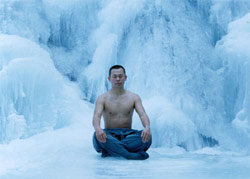
| HOME |
| NERVE |
| REVIEWS |
| ARCHIVE |
| EVENTS |
| LINKS |
| ABOUT US |
| CONTRIBUTORS |
| BACK ISSUES |
| CONTACT US |
 Spring,
Summer, Autumn, Winter....Spring
Spring,
Summer, Autumn, Winter....Spring
Directed by Ki-duk Kim
Showing at the FACT from 25 June to 1 July
Reviewed by Colin Serjent
This is a slow reflective film, which is beautifully photographed amid a stunning setting in the lakes and mountains of Korea. It centres around the various stages of a man's life, the man in question growing up in a tiny Buddhist monastery floating on a lake.
In what is in essence a very simple but nevertheless evocative story, he is an apprentice to an elderly monk, who offers him wise saying on how to conduct and lead his life.
Spring is the first stage of his life, in which he is severely reprimanded by his master for tormenting animals and fish by tieing a stone to them so they are barely able to move. He is punished by having a heavy rock attached to him, thus making it difficult for him to walk. This episode in his life is evoked on a number of occasions throughout his life.The memory of his wrong-doing will always remain with him.
Summer sees him reach puberty and is driven by lust for a young woman. The monk warns him about becoming too possessive in regard to her. But his apprentice is love-blind and ignores his advice, leading to tragic consequences, after he leaves the monastery, when he murders his wife in a state of jealousy.
Autumn is a dark time of his life. He returns to the monastery, seeking refuge, following his crime, but is eventually hunted down by the police and taken away to serve a jail sentence.
This section of the film contains a particularly memorable episode. The monk paints hundreds of words on to the wooden surrounds of the monastery with the aid of his cat's tail! As penitence for his evil doing, the monk orders him, in a labour intensive exercise, to use the same knife he slayed his wife with to precisely cut out wood from each part of all these words. Exhausted by his toils, it appears in some way he has atoned to some degree for his folly.
Winter is represented by the lake being frozen over and the monk, nearing the end of his life, deliberately burning himself to death. His former apprentice returns after completing his jail term and acquires a renewed belief in Buddhism.
The film unfortunately then loses some of its resonance and interest following the departure of the wise man, who had been the central character of the story.
Following winter, the season's cycle begins again in spring when he assumes the role of master to a small child who has been left abandoned following the death of his mother, who fell into a hole in the frozen lake.